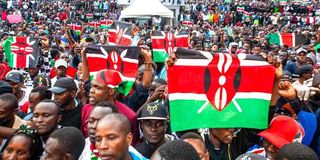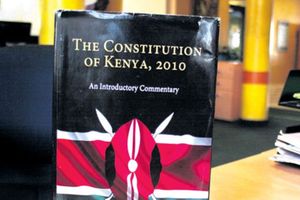
Patriotism is a feeling that is inculcated in a people to help them love their country unreservedly.
By any measure, Kenya is a poor developing country. I know this statement is injurious to the pride of my compatriots. That’s because nativism and jingoism – uninterrogated nationalism – are emotive, exuberant, and deceptive.
But you will agree with me if you apply your noggin and look underneath the skirt and kick the tires. The data doesn’t lie. Let me give you one unpalatable nugget. Ambassador Meg Whitman who departed Kenya recently has a net worth of $4 billion. That’s a whopping 4 percent of Kenya’s GDP, which is $100 billion. Her net worth is higher than that of many African countries. You’ll counter that Kenya is one of the “richest” African countries. Please go back to school if that’s your argument.
I am not interested in “African standards.” That’s because by any measure, our standards for health, wealth, education, inter-African trade and infrastructure, justice, and life expectancy are paltry. We are not in the ballpark globally. I know you will ask me to explain why we are so far behind.
The usual explanations apply – enslavement, colonialism, the cold war, post-colonial legacies, a scandalous international order, and environmental factors. That’s true, but it’s hardly the whole story. Remember this – when you point an accusing finger at somebody, you should realize that the other four fingers are pointing back at you. You accuse your tormentor with one finger, but you indict yourself with the other four. Let that sink in.
Poverty of philosophy
I want to warn our elites. The political and ideological bankruptcy of our elites is our undoing. We suffer from the poverty of philosophy and philosophy of poverty. We are greedy, myopic, and without ideological anchors. Our politics are at best pragmatic and at worst purely transactional. The calculations of our elites aren’t based on any larger noble purposes.
Rather, they are driven by nasty, primitive little fights that have nothing to do with the nation. What’s worse is that we use the “tribe” to fight these miniscule primeval fights just to fill our bellies. We hide under the tribe’s skirt to pulverize each other, even we trample underfoot those same “tribesmen.” From this perspective, our politics are sad and pre-historic.
Allow me to open your eyes. Let’s start with our political parties. These are critical because they are the instruments through which the state purchases its ideological compass. If the parties are ideologically vacuous, so must the state be. I am not talking about party manifestoes on paper.
No – I am referring to the practice of parties and the nexus of that practice to theoretical anchors. But parties are run by people – actual living, breathing human beings. If the people running parties don’t have principled ideological convictions for which they are willing, if necessary to die, then we are all sunk. Sadly, our parties pivot on their founders. Except for Kanu in its early years, this is true of every party.
Dead letter
We know what happened to Kanu when it lost its nationalist anchor become a personality cult centered on Mzee Jomo Kenyatta and later Daniel arap Moi. It became a carcass, a moribund instrumentality that lost rationale and purpose to rule. It became a dead letter that NARC mercifully euthanised in 2002. Today, Kanu remains a corpse in the museum of antiquities. There is even more bitter about our political parties. Except for Kanu, none of them have ever survived their founders in any viable form. President Kibaki even killed NARC and formed PNU. Given this history, I very much doubt that any of the extant political parties will survive their founders. In my view, that would be a herculean miracle.
What’s to be done to effectively slay this dragon of ideological nothingness? Importantly, we need to accept that political parties must be germinated in the petri-dish of visions of national interests. This must be on two fronts – Kenya’s domestic policies and its foreign policy. These can’t simply be pragmatic, or transactional. Whether to the right, left of center, or center, left, or right of center – our elites must make and commit to ideological positions consistent with their vision of national interests. Those national interests cannot be trumped by narrow personal interests. Our elites need to have heads which are bigger than their bellies. My own belief is that we can borrow a leaf from Tanzania on how to craft larger visions of our political destiny.
Let me end where I started. It matters not the beautiful laws we write on paper. That paper is no better than toilet tissue unless it’s internalised in our heads. In 2010, after years of being traumatized by President Moi, we adopted a constitution born largely of that trauma. Since then, we’ve seen a huge deficit between that constitution, the elites, and the people. It’s a mere piece of paper to most Kenyans. We lie, cheat, and steal not in spite of it but because of it. We need a complete revolution of the mind.
Makau Mutua is SUNY Distinguished Professor and Margaret W. Wong Professor at Buffalo Law School, The State University of New York. @makaumutua.













